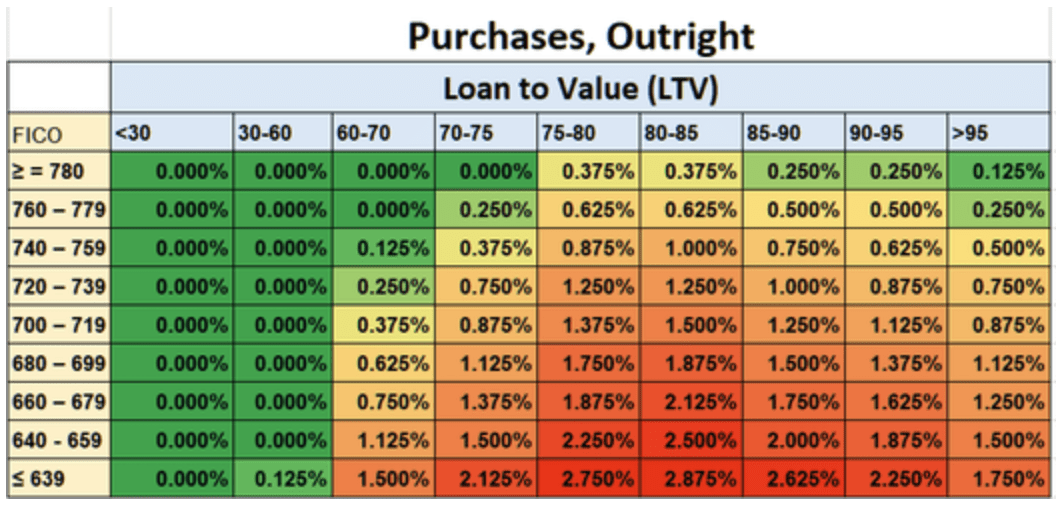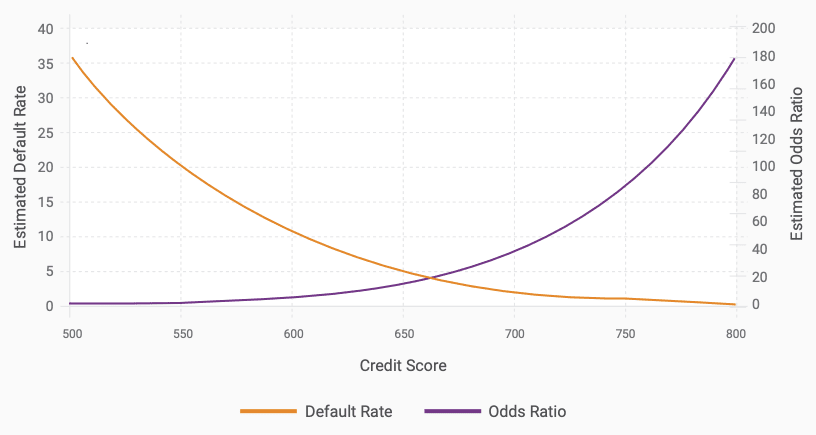There has been much alarm in the real estate investment community over a recently enacted Federal Housing Finance Agency rule made for Fannie Mae and Freddie Mac loans regarding mortgage fees.
The gist of the complaint is that home buyers with good credit will now have to subsidize those with bad credit. Technically, it’s true. However, the way it is being framed is quite misleading. The general logic goes like this: Those with a 620 FICO score will get a 1.75% discount, and those with a 740 FICO score will pay 1%.
or another example would be particularly popular tweets,
,
Homebuyers with a credit score of 680 or higher will pay ~$40 per month more on a $400,000 home loan.
Buyers with a down payment of 15% to 20% will get rid of the biggest fees.
Buyers with higher risk credit ratings and lower down payments will get lower rates and fees. pic.twitter.com/yVEp3btNJg
— Wall Street Silver (@WallStreetSilv) April 19, 2023
While what is said is technically correct, it is worse than it sounds.
First and foremost, it will Affects only Fannie Mae and Freddie Mac loans, This is for most loans given to homeowners, but will not affect FHA and VA loans, nor the nonconforming loans many investors get.
The fees being discussed here are called loan-level value adjustment or LLPA, which primarily takes into account the borrower’s FICO score and the mortgage’s LTV. To some extent, it also takes into account whether the property is owner-occupied, if it is a condo or single-family residence, whether it has a second or first mortgage, and if there are any cash-outs on refinancing.
The LLPA fee is then effectively added to the mortgage. So, for example, if the mortgage is $100,000 and has a 1% LLPA, the LLPA would be $1,000. This may be paid as a fee but is more often absorbed by the lender in exchange for a higher interest rate on the loan.
This additional cost on the mortgage is to cover Fannie Mae and Freddie Mac from the added risk of lending to riskier borrowers.
Borrowers at higher risk still paying more
The mistake many people are making here is that the percentages given are the changes, not the totals. Well, not even that much. The 1% fee mentioned is what someone with a 740 FICO score would pay if they were taking out an 80-85% LTV loan. The 1.75% “discount” is not the fee someone with a 620 FICO score would pay, but rather a reduction in that fee beforehand. And in this case, it is for someone who is taking a 95% LTV loan or more.
Prior to the passage of this rule, the LLPA fee was 3.5% for someone with a 620 FICO score who is a 95% borrower. Now it is 1.75% (a decrease of 1.75%). here is a chart from mortgage news daily Showing the effects of this rule change on loans for borrowers based on LTV and FICO scores.
And here are the actual rates that people will pay.

As mortgage news daily To analyse,
“As you can clearly see now, if you have a score of 640, you will owe significantly more than if you have a 740. Using an 80% loan-to-value ratio as an example, at 640 Your LLPA is 2.25% versus 0.875% for the 740 score. That’s a difference of 1.375%, or over $4000 on a $300k mortgage. That’s almost half of the previous difference and it’s definitely a big change.”
In fact, this rule change was made back on January 1, 2023, and it just went into effect. Here announcement is from the Federal Housing Finance Agency, and here’s Full Loan-Level Value Adjustment Matrix From Fannie Mae.
However, the long and short of it is that people with low credit will still pay more than those with high credit. The world of real estate hasn’t been completely turned upside down.
Is it still a subsidy for those with low credit?
At the beginning of this article, I said that this new rule still included subsidizing people with good credit to those with bad credit. Given that those with good credit still pay less, how is that?
This is because people with low credit scores are more likely to go into default than those with good credit. And the difference is probably bigger than most people realize.
For example, A White Paper from FICO Their model concluded that “at a score of 800, we expect approximately 180 borrowers to consistently make their loan payments on time for every one borrower who defaults. This compares favorably to consumers with a score of 600, Where one in every 11 borrowers is expected to have payment problems.
Overall, the relationship it found between FICO scores and mortgage default rates was as follows:

another paper found that between 2000 and 2002, those with a FICO score of 750 or higher had only a 1% chance of defaulting, while those with scores of 600–649 had a default rate of 15.8%, and those under 500 defaulted The pass rate was a whopping 41%. got similar results in another study by the SEC of mortgages taken out between 1997 and 2009.
The general result should not be surprising, although the size of the discrepancy may be enormous (does the 2008 financial crisis make a little more sense now?).
The LLPA is meant to cover some of this additional risk. But looking at the chart above, it appears that even the old LLPAs were a bit generous (especially considering the average loss to a bank on a mortgage that something like 40%, Lowering LLPAs for riskier borrowers is likely to push Fannie and Freddie’s costs even higher. And as basic economics would indicate, that loss would need to be met by raising rates across the board, including for borrowers with higher credit ratings.
Thus, it is true that this rule may mean that borrowers with higher credit ratings will subsidize borrowers with lower ratings.
But no, the outrageous clickbait headlines are false. Borrowers with lower credit ratings will not pay less than borrowers with higher credit ratings. And it’s important to be precise about what’s actually happening.
Find a Lender in Minutes
A lot doesn’t sit around. Quickly find a lender that specializes in investor-friendly loans that are right for you and your investment strategy.

Note by BiggerPockets: These are the views expressed by the author and do not necessarily represent the views of BigPockets.





